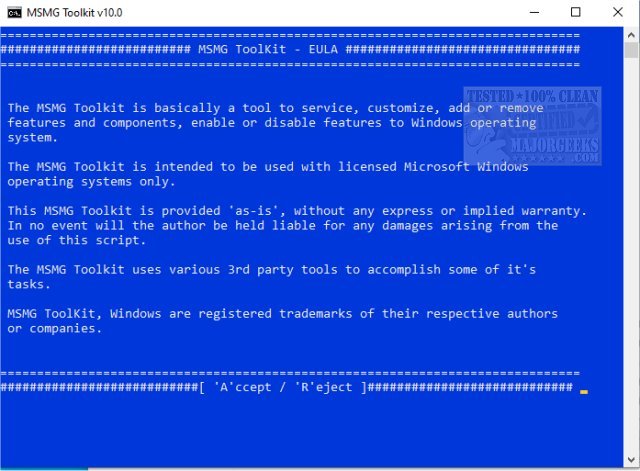MSMG ToolKit creates a slimmed down or bloat-free Windows by customizing, adding, or removing features and components and enabling or disabling features to Microsoft Windows 7, 8, and 10.
MSMG ToolKit creates a slimmed down or bloat-free Windows by customizing, adding, or removing features and components and enabling or disabling features to Microsoft Windows 7, 8, and 10.
Everything is done through a DOS command prompt but done with typing in letters to get where you want, meaning no complicated DOS commands or DOS knowledge is needed. We have always loved the entire goal here at MajorGeeks, creating a lightweight, bloat-free Windows version. Expect to spend a small amount of time getting everything you want the way you want it. You can also restore most things that you remove, should you change your mind later.
A common issue with MSMG Toolkit is the missing install.wim. Here's how to fix that problem.
Here is a list of the many things MSMG ToolKit can do:
Copy Source DVD Files from DVD Drive
Extract Source DVD Files from ISO Image
Extract Source DVD Files from OEM/IMG Image
Convert Windows Store ESD Image to WIM Image
Convert Windows Media Creation Tool (MCT) Image to WIM Image
Convert Windows ESD Image to WIM Image
Convert Windows WIM Image to ESD Image
Convert Source WIM Editions
Integrate Windows Updates
Integrate WHD Updates Repository Updates
Integrate Windows Language Packs
Integrate Windows Device Drivers
Integrate Microsoft. NET Framework 3.5
Integrate Microsoft. NET Framework 4.6.2 with Language Packs
Integrate Microsoft Internet Explorer 11 with Language Packs
Integrate Microsoft Data Deduplication
Integrate Microsoft Edge Browser App
Integrate Microsoft Remote Desktop Protocol 8.0 & 8.1
Integrate Microsoft Win32 Calculator
Integrate Windows Management Framework 5.1
Integrate Windows Multimedia Restricted Codecs
Integrate Windows Subsystem for Linux (WSL)
Integrate Windows System Restore
Integrate Windows To Go Workspace
Integrate Microsoft Default Metro Apps
Integrate Microsoft DaRT Tools to Boot & Recovery Images
Integrate Windows Thin PC Add-on Packages
Integrate Microsoft DirectX 9.0c
Integrate Microsoft Games
Integrate Windows Sidebar
Integrate Windows 8.1 Media Center Generic Activation Tokens
Integrate Windows 8.1 Pre-Activation Data & Tokens
Integrate Terminal Server Patch
Integrate Fraunhofer IIS MPEG Layer-3 Professional Codec Tweak
Integrate Custom Themes UxTheme Patch
Integrate Custom Windows Recovery Environment (WinRE)
Integrate Custom Default User Account Pictures
Integrate Custom System Files
Remove All Default Metro Apps
Remove Default Metro Apps Association
Remove Windows Components
Remove Windows Components using Package List.
Import Default Metro Apps Association from XML File
Export Default Metro Apps Association to an XML File
Make a DVD ISO Image
Burn an ISO Image to DVD
Copy Source to Bootable USB Flash Drive
Sync Source Boot and Install Images to Bootable USB Flash Drive
Burn an ISO Image to Bootable USB Flash Drive
Format a USB Flash Drive
WIM Manager to Display, Delete, Rename, Export, Split and Merge, Capture, Apply, and Cleanup WIM Image Indexes
Load/Unload WIM Image Registry for Modification
Here is the recommended method as per MSMG:
1) Integrate all the features you want to add except the .NET Framework 3.5 using the Integrate Feature Menu.
2) Integrate the Language pack you want if required
3) Integrate the Updates.
4) Remove the Apps you don't want
5) Remove the Components you don't want
6) Apply Changes; this will perform the Cleanup
7) Re-Mount the Source
8) Add the .NET Framework 3.5 using the Integrate Feature Menu.
9) Apply Changes.
10) Re-Build the Image.
Note:
For Windows 7 - Windows 10 v2004 Integration or Customization use v10.0
For Windows 7 - Windows 10 v1803 Component removal use v8.8
For Windows 10 v1809/v1909 Component removal use v10.0
MSMG ToolKit, like most third-party utilities, we suggest you make an image of your current operating system or, for the best results, do it on a clean install.
Similar:
How to Enable and Use Diagnostic Data Viewer in Windows 10
How to Use the Microsoft Support Diagnostic Tool & System Diagnostic Report
How to Restore or Verify Default Services in Windows 7, 8, and 10
How to Improve Your Wireless Network Performance
Download


